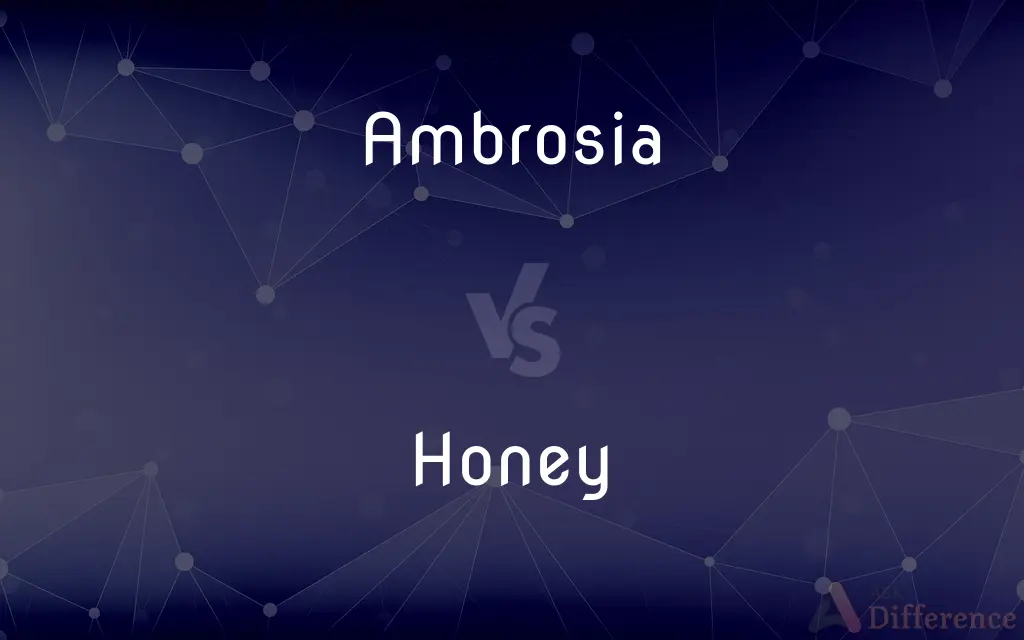Ambrosia vs. Honey — What's the Difference?

Difference Between Ambrosia and Honey
ADVERTISEMENT
Compare with Definitions
Ambrosia
In the ancient Greek myths, ambrosia (, Ancient Greek: ἀμβροσία 'immortality') is the food or drink of the Greek gods, often depicted as conferring longevity or immortality upon whoever consumed it. It was brought to the gods in Olympus by doves and served by either Hebe or Ganymede at the heavenly feast.Ambrosia is sometimes depicted in ancient art as distributed by a nymph labeled with that name and a nurse of Dionysus.
Honey
Honey is a sweet, viscous food substance made by honey bees and some related insects, such as stingless bees. Bees produce honey from the sugary secretions of plants (floral nectar) or from secretions of other insects (such as honeydew), by regurgitation, enzymatic activity, and water evaporation.
Ambrosia
Greek & Roman Mythology The food of the gods, thought to confer immortality.
Honey
A sweet, sticky yellowish-brown fluid made by bees and other insects from nectar collected from flowers.
Ambrosia
Something with an especially delicious flavor or fragrance.
ADVERTISEMENT
Honey
An excellent example of something
It's one honey of an adaptation
Ambrosia
A dessert of mixed fruits, usually including oranges and pineapple, combined with flaked coconut and often marshmallows.
Honey
A sweet yellowish or brownish viscid fluid produced by various bees from the nectar of flowers and used as food.
Ambrosia
The food of the gods, thought to confer immortality.
Honey
A similar substance made by certain other insects.
Ambrosia
The anointing-oil of the gods. Category:en:Immortality
Honey
A sweet substance, such as nectar or syrup.
Ambrosia
Any food with an especially delicious flavour or fragrance.
Honey
Sweetness; pleasantness
"The first few years could not have been all honey" (Nadine Gordimer).
Ambrosia
Anything delightfully sweet and pleasing.
Honey
(Informal) Sweetheart; dear. Used as a term of endearment.
Ambrosia
An annual herb historically used medicinally and in cooking, Dysphania botrys.
Honey
(Informal) Something remarkably fine
A honey of a car.
Ambrosia
A mixture of nectar and pollen prepared by worker bees and fed to larvae.
Honey
To sweeten with honey; add honey to.
Ambrosia
Any fungus of a number of species that insects such as ambrosia beetles carry as symbionts, "farming" them on poor-quality food such as wood, where they grow, providing food for the insect.
Honey
To make pleasant or appealing
His words were honeyed as he spoke.
Ambrosia
A dessert made of shredded coconuts and tropical fruits such as pineapples and oranges; some recipes also include ingredients such as marshmallow and cream.
Honey
To give a yellow or golden color to.
Ambrosia
The fabled food of the gods (as nectar was their drink), which conferred immortality upon those who partook of it.
His dewy locks distilled ambrosia.
Honey
(uncountable) A viscous, sweet fluid produced from plant nectar by bees. Often used to sweeten tea or to spread on baked goods.
The honey in the pot should last for years.
Ambrosia
A perfumed unguent, salve, or draught; something very pleasing to the taste or smell.
Honey
(countable) A variety of this substance.
Ambrosia
Formerly, a kind of fragrant plant; now (Bot.), a genus of plants, including some coarse and worthless weeds, called ragweed, hogweed, etc.
Honey
(rare) Nectar.
Ambrosia
The food of certain small bark beetles, family Scolytidæ believed to be fungi cultivated by the beetles in their burrows.
Honey
(figuratively) Something sweet or desirable.
Ambrosia
A dessert made from shredded coconuts and oranges, sometimes including other ingredients such as marshmallow.
Honey
A term of affection.
Honey, would you take out the trash?
Honey, I'm home.
Ambrosia
A mixture of nectar and pollen prepared by worker bees and fed to larvae
Honey
A woman, especially an attractive one.
Man, there are some fine honeys here tonight!
Ambrosia
Any of numerous chiefly North American weedy plants constituting the genus Ambrosia that produce highly allergenic pollen responsible for much hay fever and asthma
Honey
A spectrum of pale yellow to brownish-yellow colour, like that of most types of (the sweet substance) honey.
Ambrosia
Fruit dessert made of oranges and bananas with shredded coconut
Honey
Involving or resembling honey.
Ambrosia
(classical mythology) the food and drink of the gods; mortals who ate it became immortal
Honey
Of a pale yellow to brownish-yellow colour, like most types of honey.
Honey
(transitive) To sweeten; to make agreeable.
Honey
(transitive) To add honey to.
Honey
(intransitive) To be gentle, agreeable, or coaxing; to talk fondly; to use endearments.
Honey
(intransitive) To be or become obsequiously courteous or complimentary; to fawn.
Honey
A sweet viscid fluid, esp. that collected by bees from flowers of plants, and deposited in the cells of the honeycomb.
Honey
That which is sweet or pleasant, like honey.
The honey of his language.
Honey
Sweet one; - a term of endearment.
Honey, you shall be well desired in Cyprus.
Honey
To be gentle, agreeable, or coaxing; to talk fondly; to use endearments; also, to be or become obsequiously courteous or complimentary; to fawn.
Rough to common men,But honey at the whisper of a lord.
Honey
To make agreeable; to cover or sweeten with, or as with, honey.
Canst thou not honey me with fluent speech?
Honey
A sweet yellow liquid produced by bees
Honey
A beloved person; used as terms of endearment
Honey
Sweeten with honey
Honey
Having the color of honey
Share Your Discovery

Previous Comparison
Introjection vs. Internalization
Next Comparison
Dud vs. Dub













































